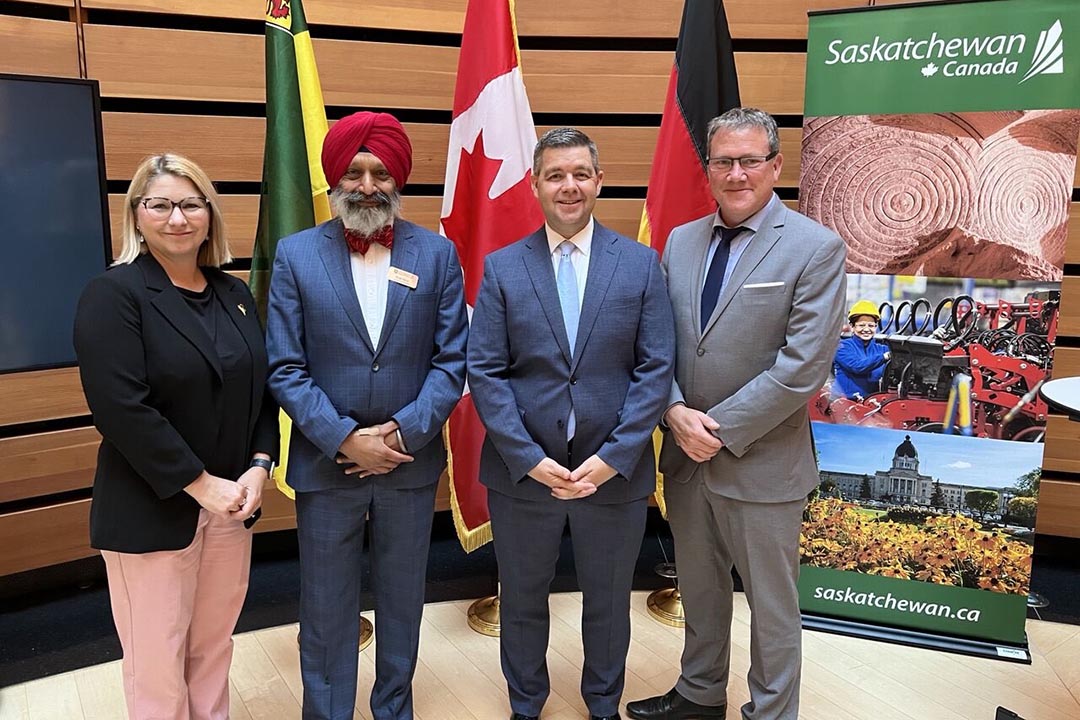
USask creates strong momentum in international partnerships
USask continues to make strides on a global scale in delivering in areas of sustainability, food and water security.
To be the university the world needs, we must open our windows to the world.
That’s the message from USask Vice-President Research Baljit Singh, who travelled to Germany this past spring with the Ministry of Trade and Export Development for their most recent international mission. During the mission, the Saskatchewan Germany office was opened, which will serve as a physical location dedicated to navigating business opportunities, increasing trade, attracting investment, and strengthening relationships.
This specific mission was led by Saskatchewan Trade and Export Development Minister Jeremy Harrison, and several USask designates were also in attendance.
This trip was one of several trips Singh has made the past year to strengthen USask’s relationship with international partners.
Earlier this year, Singh accompanied Saskatchewan’s Premier Scott Moe on a mission to India which sparked useful knowledge mobilization between the province and India in areas of critical minerals, food and water security, post-secondary education, and sustainability.
“We’re looking to build policy solutions for problems. You can’t always do that by staying at home. The way you do that is to partner with others who are looking to solve those same problems and come up with meaningful solutions that have potential benefits for many,” said Singh.
USask’s international relationships continue to grow in Germany, India, and several other areas around the world. These relationships are of vital importance, said Singh, to bring USask’s strengths to the forefront of international problems. With ground-breaking research in areas of agriculture, energy resources, critical minerals, and vaccine development, USask is committed to making impacts on these critical issues that hit home for many around the world.
This thriving research naturally lends itself to attracting international research talent. Opening USask’s doors to the world means recruiting and retaining some of the smartest minds which can grow our innovation ecosystem and population, said Singh.
“USask scholars are engaged in collaborations in a large number of countries around the globe. As a university, we’re focusing our efforts based on where we can create meaningful, impactful change,” said Singh. “By investing in strategic alliances in a select group of research institutes and universities, USask can make a huge difference in identifying world problems and coming up with solutions.
“USask is seen as a leader in many areas of importance. We want to meet the world’s requirement of food, protein, water, and energy consumption and are figuring out how we’re going to do that. As the world grows, as our own population in Saskatchewan grows, we need to be at the table to share what we know and how we are going to create a viable, sustainable future for the next generations,” said Singh.
USask’s International Office houses more than 300 international agreements with 225 entities in over 60 countries. In 2022/23 alone, 24 new and 36 renewed agreements have been signed.
Eight of the 24 new agreements signed were with institutions in Bangladesh, Germany, and India. These three countries are priorities for USask due in part to their innovative research facilities and progressive specialist research centres and importance to Saskatchewan.
For Singh, being able to add knowledge on a global scale in areas of sustainability and the agri-food industry is essential to being the university the world needs and will have great impacts for the people of Saskatchewan.
“With opportunities to collaborate with institutions, researchers and governments outside Canada, USask’s research and our positive impact is extending well past Canada’s borders,” said Singh. “Internationalization brings life-changing benefits to researchers, staff, students, businesses, and communities as it connects them with the global environment. Only through internationalization can we foster an immersive and inclusive academic environment and embrace diverse perspectives and cultures to thoughtfully address issues facing societies today.”
Together, we will undertake the research the world needs. We invite you to join by supporting critical research at USask.

